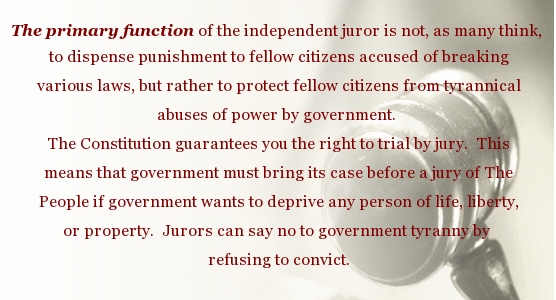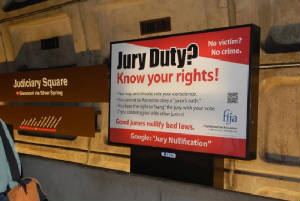
JURY NULLIFICATION LAST REFUGE FOR JUSTICE
SATRE
ALEXANDER HAMILTON (1804): Jurors should acquit even against the judge's instruction...."if exercising their judgement with discretion and honesty they have a clear conviction that the charge of the court is wrong."
(SCROLL DOWN)
*
*
*
*
*
*
*
*

Jury Nullification Last Refuge for Justice
A society that ignores or downplays Liberty is a culture that has lost its purpose. In such a regime, the people are relegated to the whims of the State and every citizen is at risk of criminal prosecution. Imagine the most evil attorney, like John Milton from The Devil’s Advocatemovie, as a DA. The irony that the initials for a District Attorney are the same as the title of the script should not be lost. Al Pacino’s Speechcould be given in any courtroom by a zealot persecutor as a closing statement.
Charging God for the injustices of the world, by a government lawyer and equating the accused with such crimes, gives new meaning to John Milton’s classic Paradise Lost. The justice system has little to do with dispensing righteous responsibility.
The Fully Informed Jury Associationprovides tremendous resources, links and information on the rights and responsibilities of jury duty. The following list of reports grants permission to copy and distribute each of the documents, if each document is reproduced without modification.
2. If You are Called for Jury Duty
3. Current State Constitutional Authority for Jury Veto
Justice BYRON WHITE (Taylor v. Louisiana, 419 US 522, 530 (1975)): "The purpose of a jury is to guard against the exercise of arbitrary power -- to make available the commonsense judgment of the community as a hedge against the overzealous or mistaken prosecutor and in preference to the professional or perhaps overconditioned or biased response of a judge."
THEOPHILUS PARSONS (2 Elliot's Debates, 94; 2 Bancroft's History of the Constitution, p. 267): "If a juror accepts as the law that which the judge states then that juror has accepted the exercise of absolute authority of a government employee and has surrendered a power and right that once was the citizen's safeguard of liberty, -- For the saddest epitaph which can be carved in memory of a vanished liberty is that it was lost because its possessors failed to stretch forth a saving hand while yet there was time."
4TH CIRCUIT COURT OF APPEALS (United States v. Moylan, 417F.2d1006, 1969): "If the jury feels the law is unjust, we recognize the undisputed power of the jury to acquit, even if its verdict is contrary to the law as given by a judge, and contrary to the evidence...If the jury feels that the law under which the defendant is accused is unjust, or that exigent circumstances justified the actions of the accused, or for any reason which appeals to their logic or passion, the jury has the power to acquit, and the courts must abide by that decision."
ALAN SCHEFLIN and JON VAN DYKE ("Jury Nullification: the Contours of a Controversy," Law and Contemporary Problems, 43, No.4, 1980): ): "The arguments for opposing the nullification instruction are, in our view, deficient because they fail to weigh the political advantages gained by not lying to the jury...What impact will this deception have on jurors who felt coerced into their verdict by the judge's instructions and who learn, after trail, that they could have voted their consciences and acquitted? Such a juror is less apt to respect the legal system."
That all these courts were mere courts of conscience, in which the juries were sole judges, administering justice according to their own ideas of it, is not only shown by the extracts [*79] already given, but is explicitly acknowledged in the following one, in which the modern "courts of conscience" are compared with the ancient hundred and count courts, and the preference [*80] given to the latter, on the ground that the duties of the jurors in the one case, and of the commissioners in the other, are the same, and that the consciences of a jury are a safer and purer [*81] tribunal than the consciences of individuals specially appointed, and holding permanent offices.

So, when activist James Babb, from that previously cited, Fully Informed Jury Association, places informative billboards at Metro stations near the courts telling passersby about jury nullification, the ancient right of jurors to judge both the facts and the law, the legal establishment shutters in fear that their corrupt gatekeeper system will be overturned.
"Jury nullification no doubt infuriates prosecutors, judges, and indeed all the petty tyrants of officialdom. Genuine democracy generally has this effect. Our ruling class is pleased to call the farcical, heavily gamed elections periodically held to confirm them in power "democracy," but the power of the jury to disregard the law and do justice as they see it represents genuine democracy, that is, demokratia, or people power. Indeed jury nullification represents one of the few remaining bastions of genuine democracy in our technocratically managed society. It must be truly maddening for the legal technocrats to have their pompously ridiculous nonsense overthrown by a gaggle of mere citizens lacking, as they often do, fine degrees and prestigious titles. And so they try and try to quash information about the real point of juries — deciding upon a just verdict — in order to render them passive and easily controlled, to turn them from real, functioning juries into inanimate totems used as props for the kabuki shows that we are assured are "fair trials."
Currently in the news is a great lesson. A courageous jury sends a clear message to a fraudulent prosecution and a politicized court. From Pro-Gun Sheriff Found Not Guilty, "jury nullifies false arrest of Nick Finch who supported Second Amendment. After closing arguments by prosecutors and the defense, the jury took less than 90 minutesto reach its verdict."
However, before sincere citizens declare victory over black robe magistrates and tyrannical District Attorneys, the New American raises further concerns in,"Despite Finch's acquittal, the question remains why a duly elected, constitutional sheriff was arrested for the actions he allegedly took. Why was Sheriff Finch not contacted by the FDLE or the governor and asked to answer the charges against him in a more disciplinary and less overtly legally hostile manner?
Will Scott and his successors use the Finch case as precedent for the assumption of the power of approval over voters' election of county sheriffs? Will every act of every one of those sheriffs in the 67 counties in the Sunshine State be subject to summary dismissal should they do something that doesn't sit well with the governor or his wealthy campaign supporters?"
SARTRE – November 4, 2013
